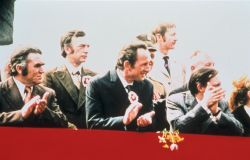
The Scar
(Blizna)
Scrs: Krzysztof Kieslowski, Romuald Karas
Pho: Slawomir Idziak
Ed: Krystyna Górnicka
Prod Mgr: Zbigniew Stanek
Prod Co: Film Polski
Poland / 1976 / Colour(revised) / DCP / Polish / Eng / Subtitles / 112min
Krzysztof Kieslowski shared with Werner Herzog the passionate belief that film was the ultimate truth teller about the world and about people. Initially he saw documentary film as a medium that could both reach and record directly the essence of a subject as well as interpret it. His film school and short films of the 1960s show a growing skepticism and the realisation that in a decade all aspects of Polish life were increasingly shaped by political authority, some of those truths would need to be hidden. Kieslowski's first feature film The Scar was the watershed – the reality was still recorded but the truth would now often be found beneath the images. The rural town of Olecko is to be the site for a new chemical plant which will, the local Communist Party decides, bring a new prosperity to the area. Its citizens are more concerned about the loss of their homes to make way for apartment blocks as well as the effect on the environment as forests are cleared to make way for the buildings. Honest engineer Stefan Bednarz (Franciszek Pieczka) is appointed to supervise its construction and it is his struggle to do the right thing by his political masters, his comrades, his wife and daughter and past events which is at the heart of the film. The Scar has some of the narrative devices and stylistic touches which would later distinguish Kieslowski's Decalogue series (1988), The Double Life of Veronique (1991) and The Three Colours trilogy (1993-94), but it principally stands as a very modern and relevant discourse on public contradictions and private conscience.
| Date | Time | Venue |
|---|---|---|
| 2/10/2016 (Sun) # | 2:00pm | Cinema, Hong Kong Film Archive |
| 22/10/2016 (Sat) | 3:30pm | UA Cine Moko |
# Post-screening talk with Mary Wong Shuk-han
The contents of the programme do not represent the views of the presenter. The presenter reserves the right to change the programme should unavoidable circumstances make it necessary.

